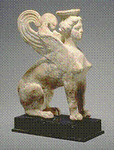
Writer Alex Keegan has a good article in the Internet Writing Journal on what transformed the Oscar-winning film Gladiator (2000, starring Russell Crowe) from a B-movie action flick to an excellent film. In "Shoot the Rhino," Keegan discusses the choices made by the screenplay's three writers. He points out that with only slight differences in the color and sensibility--the tone--the whole movie would have become less appealing. Instead, the writers focused on developing the hero, Maximus, as a man rather than just as a warrior, and made the dialog scenes weightier, "almost Shakespearean." Keegan discusses other tacks the writers took that gave the movie more impact--including convincing the director to leave out a particular special-effects scene. (Keegan doesn't say where he got the information. I assume it must be from interviews in Extras scene of the movie DVD.)
Caveat: If you haven't seen the movie yet, but want to, don't read Keegan's post because it gives away the ending.
Quote of the Day (and good to remember when I'm composing a blog post):
Most blogs suck. I'm being blunt, but no one wants to read about what you
ate for breakfast unless you're a dingo and you ate a baby.
-- Bob Mayer in He Wrote, She Wrote: the Crusie-Mayer Writing Workshop.




5 comments:
Thanks for pointing us to that article. It seems often in life that only a few tweaks separate the adequate from the excellent and that the difference between an amateur and a professional job can be very small but hugely important.
Interesting article. Thanks.
I remember thinking the same thing about blogs, the no one cares about what you had for breakfast, when I decided to start one. I think I've kept off that topic at least, although I have gotten more personal over time. I'll check out the article
The article was great and what I took from it was that the film makers were able to integrate layers of complexity into the story to humanize it and to convey universal themes. They went back and made the character less of a cartoon warrior and more likable and the images and themes of "going home", being carried and floating over the ground in a near death state provided metaphor to reinforce the themes. I believe that in fiction or film, the difference between a good story and literature or art comes down to weaving these elements in to either be noticed by the reader or viewer on a conscious level or to affect the reader or viewer on an unconscious or subliminal level.
Shauna, C.S., Charles and Lisa, thanks for the good comments. You all show insight into the point Keegan was making in his article--better insight than I had. This is why I've come to love blogging so much--the opinions and ideas of others on writing are such a wealth of information.
Post a Comment